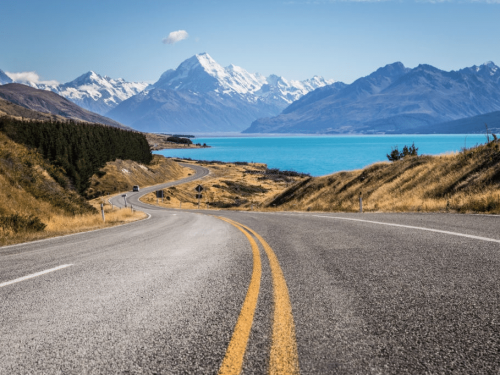Home » Study Destinations » Study In New Zealand » Living in New Zealand
Living in New Zealand is a unique experience. New Zealand is a small country located in the south of Australia in the pacific ocean New Zealand is a small country located in the south of Australia in the pacific ocean. The country has two main landmasses—the North Island and the South Island around 600 smaller islands. It has a total land area of 268,000 square kilometers. New Zealand gained independence from the British in 1947 just like India. Today, the majority of New Zealand’s population of 4.9 million is of European descent; the indigenous Māori are the largest minority, followed by Asians and Pacific Islanders. A developed country, New Zealand ranks highly in international comparisons of national performance, such as quality of life, health, education, protection of civil liberties, and economic freedom. The service sector dominates the national economy, followed by the industrial sector, and agriculture; international tourism is a significant source of revenue. New Zealand is identified as one of the world’s most stable and well-governed states. As of 2017, the country was ranked fourth in the strength of its democratic institutions, and first in government transparency and lack of corruption.
New Zealand has an advanced market economy. Today New Zealand’s economy benefits from a high level of innovation. New Zealand is heavily dependent on international trade, particularly in agricultural products. Exports account for 24% of its output, making New Zealand vulnerable to international commodity prices and global economic slowdowns. The service sector is the largest in the economy, followed by manufacturing and construction and then farming and raw material extraction. Tourism plays a significant role in the economy, contributing $12.9 billion (or 5.6%) to New Zealand’s total GDP and supporting 7.5% of the total workforce in 2016. International visitor arrivals are expected to increase at a rate of 5.4% annually up to 2022
New Zealand’s climate is predominantly temperate maritime, with mean annual temperatures ranging from 10 °C (50 °F) in the south to 16 °C (61 °F) in the north. Auckland, Wellington, and Christchurch all receive a yearly average of more than 2,000 hours of sunshine. The general snow season is early June until early October, though cold snaps can occur outside this season. Snowfall is common in the eastern and southern parts of the South Island and mountain areas across the country.
The New Zealand dollar is the official currency of the country and is also called the kiwi dollar.
Introduced in 1967, the dollar is subdivided into 100 cents. Altogether there are ten denominations—five coins and five banknotes—with the smallest being the 10-cent coin. Formerly there were lower denominations, but those were discontinued due to inflation and production costs.
The New Zealand dollar is consistently one of the 10 most traded currencies in the world, being approximately 2.0% of the global foreign exchange market daily turnover in 2013.
Wellington is the capital city of New Zealand. As the nation’s capital since 1865, the New Zealand Government and Parliament, Supreme Court and most of the public service are based in the city. Architectural sights include The Old Government Buildings—one of the largest wooden buildings in the world—as well as the iconic Beehive, the executive wing of the New Zealand Parliament. Described by Lonely Planet in 2013 as “the coolest little capital in the world”, the emerging world city has said to have grown from a bustling Māori settlement to a small colonial outpost, and from there to an Australasian creative capital with a “remarkable creative resurgence”. Wellington ranks 12th in the world for quality of living, according to a 2014 study by consulting company Mercer; of cities in the Asia–Pacific region, Wellington ranked third behind Auckland and Sydney (as of 2014).
Most of the major sporting codes played in New Zealand have British origins. Rugby union is considered the national sport and attracts the most spectators. Golf, netball, tennis, and cricket have the highest rates of adult participation, while netball, rugby union, and football (soccer) are particularly popular among young people. New Zealand has competitive international teams in rugby union, rugby league, netball, cricket, softball, and sailing
English is the predominant language in New Zealand, spoken by 96.1% of the population. As recorded in the 2013 census, Samoan is the most widely spoken non-official language (2.2%), followed by Hindi (1.7%), “Northern Chinese” (including Mandarin, 1.3%) and French (1.2%). 20,235 people (0.5%) reported the ability to use New Zealand Sign Language. Christianity is the predominant religion in New Zealand, although its society is among the most secular in the world. In the 2013 census, 55.0% of the population identified with one or more religions, including 49.0% identifying as Christians. Another 41.9% indicated that they had no religion. Early Māori adapted the tropically based east Polynesian culture in line with the challenges associated with a larger and more diverse environment, eventually developing their own distinctive culture.
Primary and secondary schooling is compulsory for children aged 6 to 16, with the majority attending from the age of 5. There are 13 school years and attending state (public) schools is free to New Zealand citizens and permanent residents from a person’s 5th birthday to the end of the calendar year following their 19th birthday. New Zealand has an adult literacy rate of 99%. The OECD’s Programme for International Student Assessment ranks New Zealand’s education system as the seventh-best in the world, with students performing exceptionally well in reading, mathematics, and science
To know more about the education system in New Zealand, click here
Some of the top cities in New Zealand are as below
Wellington
Christchurch
Auckland
Hamilton
Dunedin

New Zealand is one of the most popular destinations for international students across the world and for many also a dream destination.

One of the primary reasons why it’s a popular destination is the number of top universities present in the country.

Unlike a single intake in New Zealand universities, colleges and universities in New Zealand offer multiple intakes.

Applying for a New Zealand student visa? Here’s more information about it. Know more about the documentation, fees, etc.

Considered a Cost friendly country with comparatively lower tuition costs, find out more about the cost of studying in New Zealand

A top study abroad destination in the world, it is the education system that defines the quality and consistency for NZ.

I loved the in-depth analysis and varied career options provided by Amod. He assists at every step, starting from shortlisting career options to sending out applications to the best universities. I would recommend his consultancy to any student looking for overseas education.

Amod from ProAmica Career Development was really helpful, polite and patient while helping me find the right course and University.

I had a great counseling session with one of the team members. Absolutely loved the dedication and in-depth analysis, with a detailed explanation of the procedure. I would recommend to every student looking for studying oversees. 👍

